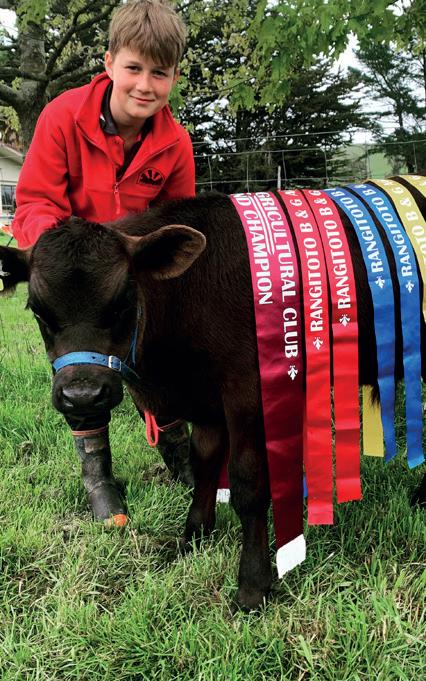
3 minute read
Weaned calves need close summer watch
It is always a great idea to get to know your local community and as Christmas approaches there can be community BBQs or local hall gatherings happening. There are plenty of knowledgeable people within your community that could watch stock while you are away or a willing local to help out during busy times. Weaned calves cannot be forgotten while in their transition time and summer pasture issues begin.
| Albie Foley with his Champion calf Goofy at the 70th Anniversary of the Rangitoto Boys & Girls Agricultural Calf Club Day. Calves and any yearling stock should be your main priority when heading into the summer dry. Poor growth rates can lead to targets not being met and possibly affecting the animal’s growth permanently. The first 3 months are critical in any calf-rearing unit but the next 4-9 months can undo all that good work. Poor growth rates will delay the timeframe of puberty in dairy heifers and profitability of beef units. The challenge is even more pronounced for spring-born calves because of the effects of summer on pasture growth and quality. If quality or quantity is lacking, this affects the calves’ ability to perform well on a pasture-only diet. As summer progresses, feed pinch, heat stress and high fibre grasses make it important to feed youngstock extra protein and energy to support growth to maintain future potential and performance. The ideal growth target is 1kg/head/day, which is only achievable when pasture is of good quality and won’t be possible once it dries out. Good quality silage would be better as hay has very little feed value. Add a well-balanced calf feed to complement the diet. Plenty of clean reachable water will be needed, as will shade to avoid heat stress. During a dry spell, pasture quality can drop significantly in energy and protein, the all-important components and key for lean muscle and skeletal growth. Calves can look full and be happily chewing their cud but if energy and protein are limited then average daily gains will be limited. It can also put pressure on the immune system. The youngstock that are most at risk are the bottom percentage and these will struggle to recover any lost growth without supplementary feed. Premium calf feeds contain the allimportant extras that are not available through feeding just silage or straight palm kernel. These feeds are lacking in calcium and B group vitamins such as B1, which can affect the nervous system. Youngstock can still be at high health risk and can show a scour through the summer, along with other health issues. Don’t just put this down to worms, especially if you have a 28-day drench programme in place. Some single active pour-on drenches mean Cooperia worms can be very resistant. Take samples and check with the vet as a scour can have many causes. Facial eczema is more prevalent through the summer months. Zinc boluses are good but you may still need to top up the youngstock orally. It takes 3 weeks to build up liver protection so using a pelletised multi feed with added zinc could be better nutritionally over summer. Before heading away, remember to check boundary fences, water systems, gates on roadsides, power fences, reduce stock numbers where possible and prioritise the young stock.
For further information, contact your Farmlands Technical Field Officer or the friendly team at your local Farmlands store.
Article supplied by Karen Fraser, Farmlands Technical Specialist


Terms and conditions apply.










